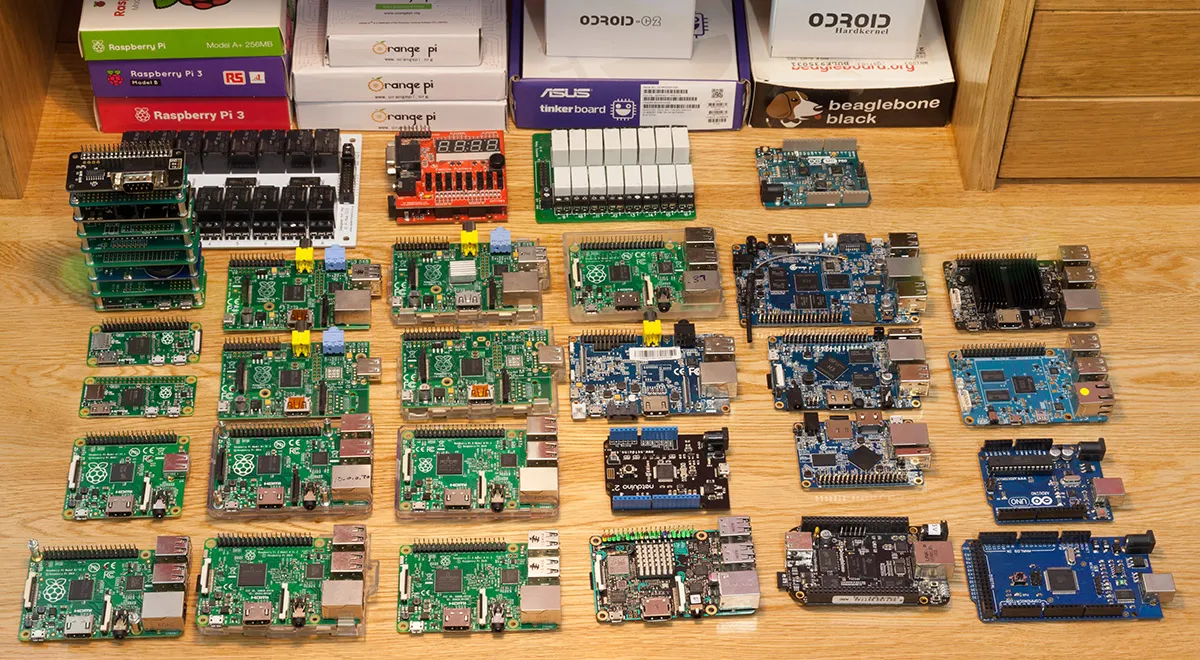Raspberry Pi, Odroid, Orange Pi and Asus Tinker
Compatibility testing on the Raspberry Pi, Odroid, Orange Pi and Asus Tinker Board platforms

In addition to the small form factor Raspberry Pi there are numerous other small form factor computer boards (also known as small single-board computers) available using a range of processors and different input/output options.
Many of these computers are now using the same 40 or 26-pin dual in-line header for the GPIO connection and they use the same or similar pinout to the Raspberry Pi to ensure compatibility with the various HATS and add-on development boards available worldwide.
With each new release of a Raspberry Pi model, we have purchased a new board to test with all our development boards and verify that there are not any new issues we have to workaround.
An example of this was the recent issue with compatibility problems was the release of the Raspberry Pi 3 which initially broke the UART port on the GPIO header by changing the port to be a software UART which changed speed depending on the processor load! There are now different workarounds for this including disabling the internal Bluetooth and redirecting the hardware port to the GPIO pins and also setting the Pi 3 to run at a fixed speed.
We also test our development boards with the more popular alternatives to the Raspberry Pi from other manufacturers.
We have purchased many different small form factor computer boards over the past few years and we have tested our boards with the following platforms and operating systems.
Asus Tinker Board
The Tinker Board from Asus is the same form factor as the Raspberry Pi 3 and features a quad-core Arm Cortex A17 CPU running at 1.8GHz, ARM Mali-T764 GPU, and 2GB of DDR3 memory compared to the 1GB on the Raspberry Pi 3. There is hardware support for H.265 4K video decoding, gigabit Ethernet and swappable antenna lead for the built-in 802.11 b/g/n wi-fi module so you can add an external antenna without any soldering. We ordered our board from Pi Supply in the UK.
Software support for the Tinker Board is provided by Asus with their own version of Debian available. They also provide their own GPIO API for Python and for C.
One issue we found when first booting the Asus Tinker was the requirement for a keyboard, mouse and monitor needing to be connected to enable the Ethernet or wi-fi connection. This means that you cannot use the board headless without first enabling the network connection on a monitor.
Once the Ethernet connection was set up all the other software config can be done via a remote SSH session.
The operating system has the I2C bus and UART on the GPIO connector enabled by default but SPI is not yet supported.
Our knowledge base has a new section for the Asus Tinker board with a list of supported development boards and software setup instructions. Asus Tinker Board Tutorials
Odroid from Hardkernel
Odroid boards from Hardkernel have a wide range of small form factor boards and many have 40-pin GPIO connectors which allow you to use external add-on boards.
We have tested our boards with the Odroid C1 and Odroid C2 boards. Ubuntu and Android OS images are available from the Odroid website. We used the Armbian OS for our tests and the operating system has the I2C bus on the GPIO connector enabled by default but we could not get the SPI bus to work with our python libraries.
Our knowledge base has a section for the Odroid boards with a list of supported development boards and software setup instructions. Odroid Tutorials.
Orange Pi
Orange Pi manufactures a range of small form factor computer boards which feature the 40pin GPIO connector.
We have tested our range of development boards on three of their models:
Orange Pi Plus2 which uses the AllWinner H3 SoC, 2GB DDR3 SDRAM, 16GB flash memory and gigabit Ethernet
Orange Pi One which uses the AllWinner H3 SoC, and has 512MB DDR3 SDRAM
Orange Pi PC which uses the AllWinner H3 SoC, and has 1GB DDR3 SDRAM. All I2C boards were checked but could not find a way to use the UART pins for the Serial Pi and RS485 Pi boards.
For our own testing, we used Armbian from www.armbian.com which has I2C and UART support without additional configuration.
Our knowledge base has a new section for the Orange Pi boards with a list of supported development boards and software setup instructions. Orange Pi Tutorials